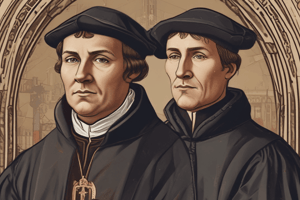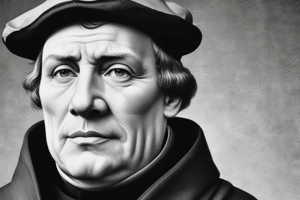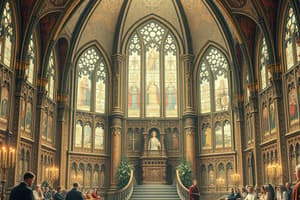Podcast
Questions and Answers
What was one of the key social consequences of the Protestant Reformation?
What was one of the key social consequences of the Protestant Reformation?
- A strengthened central authority of the Vatican
- Decreased literacy rates among the populace
- Increased literacy and a sense of personal responsibility (correct)
- Reduced emphasis on education in religious contexts
Which of the following was a result of the Catholic Church's response to the Reformation?
Which of the following was a result of the Catholic Church's response to the Reformation?
- Creation of the Council of Trent (correct)
- Formation of the Lutheran Church
- Expansion of Protestant teachings
- Establishment of the Anglican Church
What impact did the Protestant Reformation have on political structures in Europe?
What impact did the Protestant Reformation have on political structures in Europe?
- It eliminated all forms of religious conflict in Europe.
- It emphasized the power of the Catholic Church in governance.
- It led to decreased autonomy for monarchs.
- It resulted in increased control of religious affairs by monarchs. (correct)
Which of the following accurately describes the concept of 'Soli Deo Gloria'?
Which of the following accurately describes the concept of 'Soli Deo Gloria'?
What was a common theme among the different interpretations of the Reformation by historians?
What was a common theme among the different interpretations of the Reformation by historians?
What was a primary motive behind King Henry VIII's establishment of the Church of England?
What was a primary motive behind King Henry VIII's establishment of the Church of England?
Which of the following factors contributed significantly to the spread of the Protestant Reformation?
Which of the following factors contributed significantly to the spread of the Protestant Reformation?
What does the term 'Sola Scriptura' represent in Protestant beliefs?
What does the term 'Sola Scriptura' represent in Protestant beliefs?
Which key figure is known for developing Calvinism?
Which key figure is known for developing Calvinism?
What is one of the criticisms leading to the Protestant Reformation regarding church practices?
What is one of the criticisms leading to the Protestant Reformation regarding church practices?
Which belief emphasizes that salvation is through God's grace alone?
Which belief emphasizes that salvation is through God's grace alone?
What role did Renaissance humanism play in the Protestant Reformation?
What role did Renaissance humanism play in the Protestant Reformation?
Which of the following church abuses contributed to discontent before the Protestant Reformation?
Which of the following church abuses contributed to discontent before the Protestant Reformation?
Flashcards
Religious Division
Religious Division
The Reformation led to the creation of various Christian denominations, including Lutheranism, Calvinism, and Anglicanism, marking a significant shift in Western Christianity.
Political Changes
Political Changes
The Reformation sparked conflicts and political unrest throughout Europe, ultimately shaping modern European political landscapes.
Social Changes
Social Changes
The Reformation emphasized individual interpretation of scripture, promoting personal responsibility and literacy.
Counter-Reformation
Counter-Reformation
Signup and view all the flashcards
Wars of Religion
Wars of Religion
Signup and view all the flashcards
Protestant Reformation
Protestant Reformation
Signup and view all the flashcards
Martin Luther
Martin Luther
Signup and view all the flashcards
John Calvin
John Calvin
Signup and view all the flashcards
Church Abuses
Church Abuses
Signup and view all the flashcards
Political Factors
Political Factors
Signup and view all the flashcards
Social and Economic Conditions
Social and Economic Conditions
Signup and view all the flashcards
Renaissance Humanism
Renaissance Humanism
Signup and view all the flashcards
Print Technology
Print Technology
Signup and view all the flashcards
Study Notes
Introduction
- The Protestant Reformation was a significant religious movement in 16th-century Europe.
- It challenged the Catholic Church's authority and led to the formation of Protestant Christianity.
- Primarily initiated by Martin Luther, its spread was aided by print technology, political instability, and societal discontent.
Key Figures of the Reformation
- Martin Luther: A key figure, he sparked the Reformation with his Ninety-Five Theses, criticizing the Catholic Church.
- John Calvin: A French theologian who developed Calvinism, emphasizing predestination.
- King Henry VIII: His desire for a male heir and disputes with the Pope led to the English Reformation and the Church of England.
Causes of the Reformation
- Church Abuses: Criticisms included indulgences, simony, and perceived misconduct among clergy.
- Political Factors: Rulers viewed the Church as a power rival, with conflicts over taxation and influence prompting breaks from Rome.
- Social and Economic Conditions: Resentment towards the Church's wealth and perceived exploitation of commoners supported reform movements.
- Renaissance Humanism: Emphasizing individual study and critical thinking, humanism encouraged questioning traditional beliefs, paving the way for reform.
- Print Technology: The printing press facilitated the rapid spread of religious texts and reformer ideas.
Key Beliefs of Protestantism
- Sola Scriptura: Scripture is the sole authority in faith and practice.
- Sola Fide: Faith alone, not good works, provides justification before God.
- Sola Gratia: Salvation is solely through God's grace.
- Solus Christus: Christ is the sole mediator between God and humanity.
- Soli Deo Gloria: Glory to God alone.
Impact of the Reformation
- Religious Division: Western Christianity fragmented into denominations like Lutheranism, Calvinism, and Anglicanism.
- Political Changes: Religious conflicts and upheaval shaped modern European politics.
- Social Changes: Protestant emphasis on individual interpretation fostered personal responsibility and increased literacy.
- Education Reform: Protestant reformers established schools and universities, boosting education and literacy.
Key Consequences of the Reformation
- Counter-Reformation: The Catholic Church responded with internal reforms and the Council of Trent to counter Protestant teachings.
- Wars of Religion: Conflicts between Catholics and Protestants, like the Thirty Years' War, devastated Europe.
- Rise of National Churches: Monarchs and rulers gained more control over religious affairs, leading to state-supported churches.
Reformation Interpretations and Debates
- Historians debate the significance of various contributing factors to the Reformation.
- Understanding the Reformation requires considering how individual actions and societal shifts interact.
- The Reformation remains a subject of ongoing research and discussion among historians.
Studying That Suits You
Use AI to generate personalized quizzes and flashcards to suit your learning preferences.




